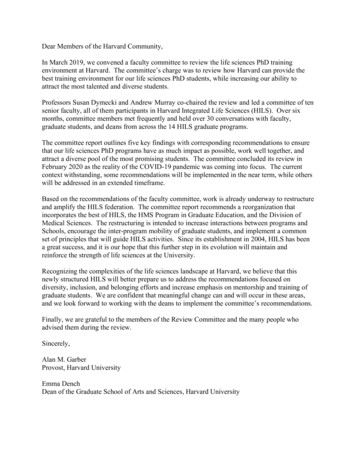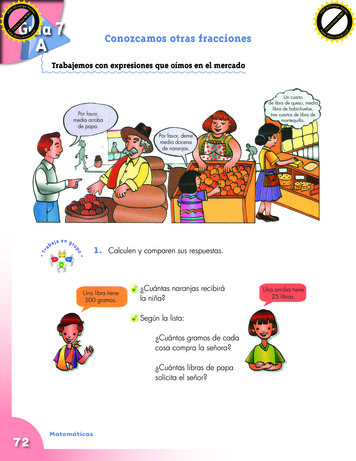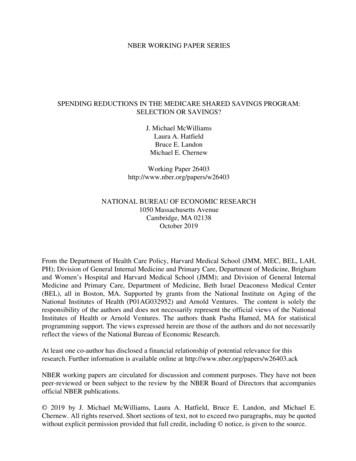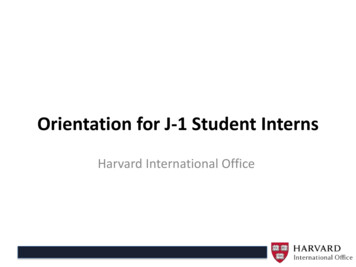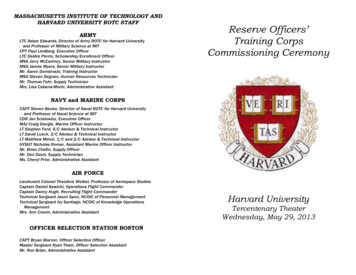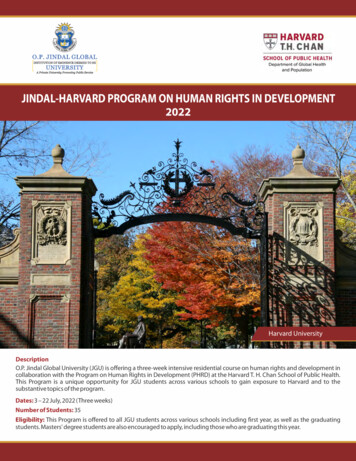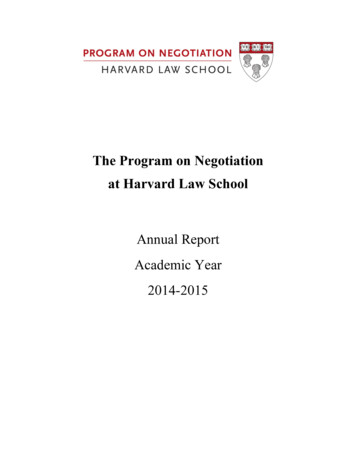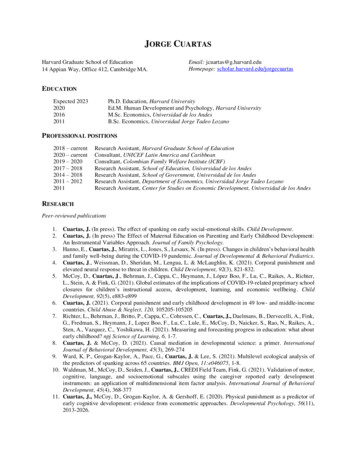
Transcription
JORGE CUARTASHarvard Graduate School of Education14 Appian Way, Office 412, Cambridge MA.Email: jcuartas@g.harvard.eduHomepage: scholar.harvard.edu/jorgecuartasEDUCATIONExpected 2023202020162011Ph.D. Education, Harvard UniversityEd.M. Human Development and Psychology, Harvard UniversityM.Sc. Economics, Universidad de los AndesB.Sc. Economics, Universidad Jorge Tadeo LozanoPROFESSIONAL POSITIONS2018 – current2020 – current2019 – 20202017 – 20182014 – 20182011 – 20122011Research Assistant, Harvard Graduate School of EducationConsultant, UNICEF Latin America and CaribbeanConsultant, Colombian Family Welfare Institute (ICBF)Research Assistant, School of Education, Universidad de los AndesResearch Assistant, School of Government, Universidad de los AndesResearch Assistant, Department of Economics, Universidad Jorge Tadeo LozanoResearch Assistant, Center for Studies on Economic Development, Universidad de los AndesRESEARCHPeer-reviewed publications1.2.Cuartas, J. (In press). The effect of spanking on early social-emotional skills. Child Development.Cuartas, J. (In press) The Effect of Maternal Education on Parenting and Early Childhood Development:An Instrumental Variables Approach. Journal of Family Psychology.3. Hanno, E., Cuartas, J., Miratrix, L., Jones, S., Lesaux, N. (In press). Changes in children’s behavioral healthand family well-being during the COVID-19 pandemic. Journal of Developmental & Behavioral Pediatrics.4. Cuartas, J., Weissman, D., Sheridan, M., Lengua, L. & McLaughlin, K. (2021). Corporal punishment andelevated neural response to threat in children. Child Development, 92(3), 821-832.5. McCoy, D., Cuartas, J., Behrman, J., Cappa, C., Heymann, J., López Boo, F., Lu, C., Raikes, A., Richter,L., Stein, A. & Fink, G. (2021). Global estimates of the implications of COVID-19-related preprimary schoolclosures for children’s instructional access, development, learning, and economic wellbeing. ChildDevelopment, 92(5), e883-e8996. Cuartas, J. (2021). Corporal punishment and early childhood development in 49 low- and middle-incomecountries. Child Abuse & Neglect, 120, 105205-1052057. Richter, L., Behrman, J., Britto, P., Cappa, C., Cohrssen, C., Cuartas, J., Daelmans, B., Dervecelli, A., Fink,G., Fredman, S., Heymann, J., Lopez Boo, F., Lu, C., Lule, E., McCoy, D., Naicker, S., Rao, N., Raikes, A.,Sten, A., Vazquez, C., Yoshikawa, H. (2021). Measuring and forecasting progress in education: what aboutearly childhood? npj Science of Learning, 6, 1-7.8. Cuartas, J. & McCoy, D. (2021). Causal mediation in developmental science: a primer. InternationalJournal of Behavioral Development, 45(3), 269-2749. Ward, K. P., Grogan-Kaylor, A., Pace, G., Cuartas, J. & Lee, S. (2021). Multilevel ecological analysis ofthe predictors of spanking across 65 countries. BMJ Open, 11:e046075, 1-8.10. Waldman, M., McCoy, D., Seiden, J., Cuartas, J., CREDI Field Team, Fink, G. (2021). Validation of motor,cognitive, language, and socioemotional subscales using the caregiver reported early developmentinstruments: an application of multidimensional item factor analysis. International Journal of BehavioralDevelopment, 45(4), 368-37711. Cuartas, J., McCoy, D., Grogan-Kaylor, A. & Gershoff, E. (2020). Physical punishment as a predictor ofearly cognitive development: evidence from econometric approaches. Developmental Psychology, 56(11),2013-2026.
12. Cuartas, J. (2020). Heightened risk of child maltreatment amid the COVID-19 pandemic can exacerbatemental health problems for the next generation. Psychological Trauma: Theory, Research, Practice, Policy,12(S1), S195-S196.13. Lu, C., Cuartas, J., Fink, G., McCoy, D., Liu, K., Li, Z., Daelmans, B., & Ritcher, L. (2020). Inequalities inearly childhood care, education, and development in low- and middle-income countries: 2009-2018. BMJGlobal Health, 5(2), e002314-e002314.14. Cuartas, J., Jeong, J., Rey-Guerra, C., McCoy, D., & Yoshikawa, H. (2020). Maternal, paternal, and othercaregivers’ stimulation in low- and- middle-income countries. PLOS One, 15(7), e0236107-e0236107.15. Cuartas, J. & Leventhal, T (2020). Exposure to community violence and children’s mental health: A quasiexperimental examination. Social Science and Medicine, 246, 112740-112740.16. Cuartas, J., Ward, K., Ma, J., & Grogan-Kaylor, A. (2020). Physical punishment and Colombian childrenand adolescents’ cognitive and behavioral outcomes. Journal of Applied Developmental Psychology, 68,101140.17. Cuartas, J., Rey-Guerra, C., McCoy, D. & Hanno, E. (2020). Maternal knowledge, stimulation, and earlychildhood development in low-income families in Colombia. Infancy, 25(5), 526-534.18. Cuartas, J. (2020). Improving the measurement of children’s mental health problems in Colombia with itemresponse theory. Revista Colombiana de Psicología, 29(1), 87-103.19. García, S. & Cuartas, J. (2020). Can poverty alleviation programs crowd-in private support? Short- andmiddle-run effects of a conditional cash transfer program on inter-household transfers. Journal of SocialPolicy, 50(3), 511-532.20. Cuartas, J., McCoy, D., Rey-Guerra, C., Britto, P., Beatriz, E. & Salhi, C. (2019). Early childhood exposureto non-violent discipline and physical and psychological aggression in low- and- middle-income countries:national, regional, and global prevalence estimates. Child Abuse & Neglect, 92, 93-105.21. Cuartas, J., Grogan-Kaylor, A., Ma, J. & Castillo, B. (2019). Civil conflict, domestic violence, and povertyas predictors of corporal punishment in Colombia. Child Abuse & Neglect, 90, 108-119.22. García, S., Harker, A. & Cuartas, J. (2019). Building dreams: the short-term impacts of a conditional cashtransfer program on aspirations for higher education. International Journal of Educational Development, 64,48-57.23. Cuartas, J. & Roy, A. (2019). The latent threat of community violence: indirect exposure to local homicidesand adolescents’ mental health in Colombia. American Journal of Community Psychology, 64(1-2), 218-230.24. McCoy, D., Cuartas, J., Waldman, M. & Fink, G. (2019). Contextual variation in young children’sacquisition of social-emotional skills. PLOS One, 14(11), e0223056-e0223056.25. Cuartas, J., Liévano, L., Martínez, M.A., Hessel, P. (2019). The invisible wounds of five decades of armedconflict: inequalities in mental health and their determinants in Colombia. International Journal of PublicHealth, 64(5), 703-711.26. Hessel, P., Martínez, M.A. & Cuartas, J. (2019). Acute exposure to violent neighborhood crime anddepressive symptoms among older individuals in Colombia. Health and Place, 59, 102162-102162.27. Cuartas, J. & Rey-Guerra, C. (2019). Ecological predictors of perceiving scarcity in childhood. ChildIndicators Research, 12(1), 99-113.28. Cuartas, J. (2018). Physical punishment against the early childhood in Colombia: national and regionalprevalence, sociodemographic gaps, and ten-year trends. Children and Youth Services Review, 93, 428-440.29. Cuartas, J., McCoy, D. & Molano, A. (2018). The acute effect of community violent crime on maternalengagement in cognitive and socioemotional stimulation. Early Childhood Research Quarterly, 45, 143-154.30. Cuartas, J. (2018). Neighborhood crime undermines parenting: Violence in the vicinity of households as apredictor of aggressive discipline. Child Abuse & Neglect, 76, 399-399.31. Cuartas, J. (2016). ¿Desigualdad y pobreza como determinantes de la confianza generalizada? Análisis condatos panel. Revista Desarrollo y Sociedad, 76, 91-121.Policy briefs and other publications1.2.Cuartas, J. & Rey-Guerra, C. (2020). Guidance for families to prevent violence in early childhood in thetime of COVID-19: Toolkit. United Nations Children’s Fund (UNICEF). (Link)Cuartas, J. (2021). Ending corporal punishment in the early years of childhood: an essential right and needof every young child. Early Childhood Development Action Network., End Violence Against Children, &End Corporal Punishment (Link).
3.4.5.6.7.8.9.10.11.12.13.14.Cuartas, J. (2021). Los castigos físicos pueden afectar el desarrollo cerebral de los niños. InteramericanDevelopment Bank. (Link)Cuartas, J. & Rey-Guerra, C. (2021). Un paquete de herramientas para prevenir la violencia contra los niñosy niñas en tiempos de COVID-19. Interamerican Development Bank. (Link)Jones, S, Brush, K Cuartas, J. & Bailey, R. (2021). Navigating SEL from the inside out. Looking inside& across 33 leading SEL programs: a practical resource for schools and OST providers. EASEL lab, HarvardGraduate School of Education. (Link)Gonzalez, K., Hanno, E., Cuartas, J., Jones, S. & Lesaux, N. (2020). How are they faring? Impacts of theCOVID-19 pandemic on the lives of families and young children in Massachusetts. Saul Zaentz EarlyEducation Initiative, Harvard Graduate School of Education. (Link)Cuartas, J. (2020). Cuatro cosas que debes saber sobre el castigo físico infantil en América Latina y elCaribe. Interamerican Development Bank. (Link)Cuartas, J. (2020). Tres razones para nunca utilizar el castigo físico, de acuerdo con la ciencia. InstitutoColombiano de Bienestar Familiar (ICBF). (Link)Cuartas, J. (2020). El regreso de los jardines infantiles también debe ser prioridad. Revista Semana. (Link)Cuartas, J. (2020). Criar a correazos: una práctica común en Colombia. Revista Semana.Black, M., Bromley, K., Cavallera, V., Cuartas, J., Dua, T., Weber, A. (2019). The Global Scale forEarly Development (GSED). Early Childhood Matters. (Link)Cuartas, J. (2019). Estimating the global prevalence of violent and non-violent discipline in early childhood.Global Initiative to End all Corporal Punishment of Children, Guest Feature, 4 July. (Link)Cuartas, J. (2019). Los riesgos de criar con palmadas y correazos. Revista Semana. (Link)Maldonado-Carreño, C., Rey-Guerra, C., Cuartas, J., Plata, T., Rodríguez, J., Largacha, E., Yoshikawa, H.& Dirección de Primera Infancia – MEN. (2018). Medición de la calidad de la educación inicial en Colombiaen la modalidad institucional. Notas de Políticas en Educación, Universidad de los Andes. (Link)AWARDS & Science and Innovation Fellowship (10,000 USD), Harvard Center on the Developing ChildKnowledge Fellowship (2,000 USD), Early Childhood Development Action Network – ECDANSECC Dissertation Funding Award (2,000 USD), Society for Research in Child Development SRCDMarta Arango Montoya Award for best research study in early childhood development inColombia (2000 USD), Fondo Acción.Jeanne Humphrey Block Dissertation Award (2,500 USD), Henry A. Murray Research ArchiveResearch Award (2,550 USD), Harvard Institute for Quantitative Social ScienceBrazil Research Grant (1,200 USD), Harvard David Rockefeller Center for Latin AmericanStudiesSummer Research Travel Grant (1,200 USD), Harvard David Rockefeller Center for LatinAmerican StudiesGSAS Professional Development Fund (2,500 USD), Harvard GSASEarly Career Scholar Program (1,200 USD), International Society for the Study of BehaviouralDevelopmentDoctoral research grant (1,500 USD), Harvard Graduate School of EducationStudent Travel Award (300 USD), Harvard Institute for Quantitative Social ScienceStudent Travel Award (250 USD), Harvard David Rockefeller Center for Latin American StudiesResearch Award (2,400 USD), Harvard Institute for Quantitative Social ScienceStudent Travel Award (750 USD), Harvard GSAS Student CouncilStudent Travel Award (750 USD), Harvard Graduate School of EducationStudent Travel Award (650 USD), Harvard Institute for Quantitative Social ScienceTravel Award (1,700 USD), Universidad de los AndesResearch Award (40,000 USD), Universidad de los AndesResearch Award (7,500 USD), Universidad Jorge Tadeo LozanoFull Scholarship, Universidad Jorge Tadeo Lozano
BROADER IMPACT20202019I testified in the Colombian Senate and House of Representatives as they discussed a bill toprohibit corporal punishment.My research on corporal punishment was cited in a bill (Proyecto de Ley Número 212 de 2019Cámara) to prohibit corporal punishment in Colombia.PRESENTATIONSAcademic conferences20212021201920172016International Society for the Prevention of Child Abuse and Neglect, Milan, Italy.Society for Research in Child Development; Virtual Meeting.Society for Research in Child Development; Baltimore, USA.Latin American Studies Association; Lima, Perú.Colombian Economics Conference; Bogotá, 19Corporal punishment of children and public health: what does the research tell us? WorldHealth Organization (WHO) and End Violence Against Children. (Link)IDB Regional Policy Dialogue 2021 – Innovations during the pandemic in health, socialprotection, and child development. Interamerican Development Bank (IDB) and Harvard Schoolof Public Health.IX International Symposium on Early Childhood Development, Núcleo Ciência Pela Infância(NCPI), Brazil.Ending corporal punishment in the early years of childhood: an essential right and need ofyoung children, End Violence Against Children and Early Childhood Development ActionNetwork (ECDAN). (Link)Congreso Nacional de Pediatría, Sociedad Colombiana de Pediatría, Bogotá, Colombia. (Link)COVID-19 y violencia en la primera infancia en América Latina y el Caribe, Alianza deCónyuges de Jefes de Estado (ALMA). Latin America & The Caribbean.Prohibir el castigo físico y humillante, imperativo para eliminar la violencia contra la niñez,Red Papaz, Bogotá, Colombia. (Link)Primer Encuentro Nacional para el Acompañamiento y Fortalecimiento a las Familias desdela Primera Infancia, Instituto Colombiano de Bienestar Familiar (ICBF), Bogotá, Colombia.Encuentro Internacional sobre Castigo Físico, Universidad de la Sabana, Chía, Colombia.AFFILIATIONS & SERVICE2019 – current2021 – current2021 – current2019 – current2018 – current20202009Ad Hoc Reviewer, The Lancet; Child Development; Developmental Psychology;Development & Psychopathology; Child Abuse & Neglect; Psychology of Violence; Children& Youth Services Review; Epidemiology and Psychiatric Sciences; Developmental ChildWelfareMember of the Scientific Advisory Committee, Lancet Commission on Gender-basedViolence and Maltreatment of Young PeopleMember, Child Well-Being Research NetworkGraduate Student Affiliate, Harvard Institute for Quantitative Social ScienceCo-Founder and Co-Director, Apapacho (apapacho.com.co)Member, Advisory Board, Instituto Colombiano de Bienestar Familiar (ICBF)Student Representative, Universidad Jorge Tadeo LozanoTEACHING EXPERIENCE2020-2021Teaching Fellow, Science-Driven Innovation in the Early Childhood Ecosystem, HarvardUniversity
2021202120202017 – 20182015 – 20162014 – 2016Teaching Fellow, Early Childhood Development in Global Contexts, Harvard UniversityTeaching Fellow, Latent Variable Analysis: Structural Equation Modeling, HarvardUniversityTeaching Fellow, Understanding Today’s Educational Testing, Harvard UniversityAdjunct professor, Public Policy Evaluation, Universidad de los AndesAdjunct professor, Poverty and Inequality, Universidad Jorge Tadeo LozanoAdjunct professor, Introduction to Economics, Universidad Jorge Tadeo LozanoSKILLSSoftware: Stata, R, Mplus, ArcGIS, EndNote, CovidenceLanguages: English (fluent), Spanish (native).SELECTED MEDIA 212021202020202019201920192019How spanking may affect brain development in children, The Harvard GazetteLandmark study shows spanking alters children’s brain development, End Violence AgainstChildrenShould parents use corporal punishment to discipline children? Never, says one doctor. Yes,but don’t use your hand, says another, South China Morning PostIdeia de que palmada nos faz fortes é ultrapassada, diz pesquisador de Harvard, Folha deS.Paulo, BrazilPalmadas comprometem desenvolvimento cerebral de crianças, mostra estudo, Folha deS.Paulo, BrazilThe effect of spanking on the brain, Harvard Graduate School of Education UsableKnowledgeEffect of spanking on kids’ brains similar to abuse, WebMDSmacking kids could affect brain development in a way similar to more severe violence,9News Melbourne, Australia‘Las palmadas afectan el cerebro de los niños’: Harvard, El Tiempo, ColombiaStudy reveals spanking may affect brain development of a child, Hindustan Times, IndiaSmacking children can affect their brain development, Harvard study says, The Independent,The United KingdomSpanking may change children’s brains like more severe forms of violence, The AcademicTimes, United StatesStudents awarded fellowships by the Center on the Developing Child, The Harvard GazetteCastigos físicos afectan hasta el cerebro, El País de Cali, ColombiaThe consequences of corporal punishment – connecting research and policy action to reducethe harmful practice in Colombia and around the world, Harvard Graduate School ofEducation NewsConozca las consecuencias del castigo físico en los niños, Canal RCN, ColombiaConozca las consecuencias que tendría el castigo físico, según la ciencia, Blu Radio, ColombiaEl largo camino que queda para prohibir definitivamente el castigo físico en menores de edad,Revista Semana, ColombiaLast updated: November 20, 2021
BROADER IMPACT 2020 I testified in the Colombian Senate and House of Representatives as they discussed a bill to prohibit corporal punishment. 2019 My research on corporal punishment was cited in a bill (Proyecto de Ley Número 212 de 2019 Cámara) to prohibit corporal punishment in Colombia. PRESENTATIONS Academic conferences


